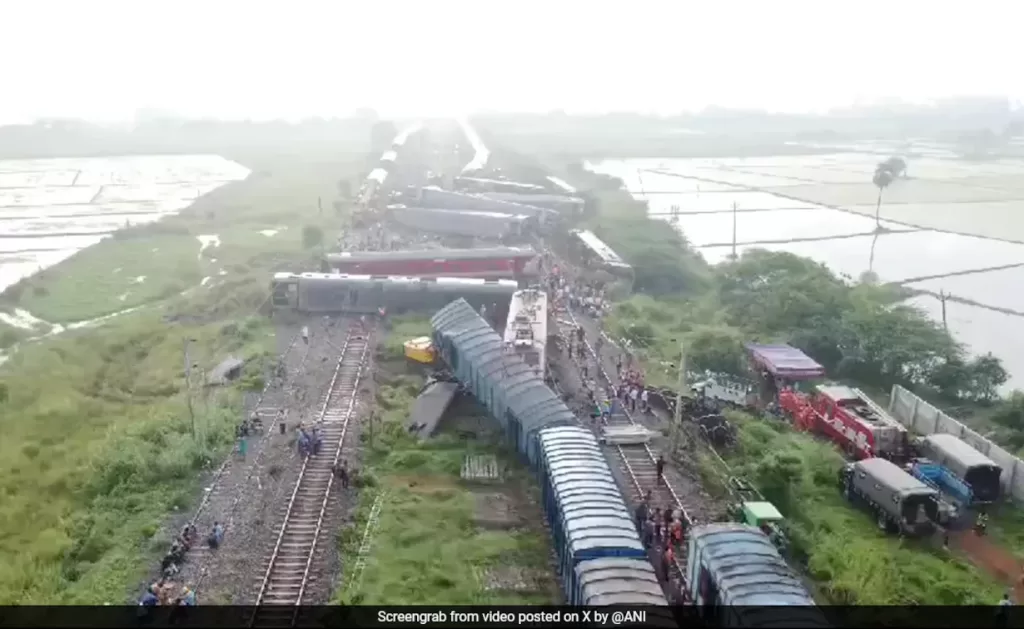Tamil Nadu Train Collision Update 2024, Prompting Urgent Safety Reforms Amid Rising Concerns
A devastating train collision occurred in Tamil Nadu on October 11, 2024, as the Mysore-Darbhanga passenger train struck a stationary goods train at Kavaraippettai railway station, near Chennai. This collision, which resulted in the derailment of 12 coaches and injuries to 19 passengers, has raised significant concerns about railway safety standards in India, prompting political leaders and experts to demand immediate reforms.

The Tragic Collision: Timeline and Immediate Impact
The collision took place at approximately 8:30 p.m., as the passenger train entered a loop line due to signaling errors, crashing into the stationary goods train. The force of the impact derailed 12 coaches, while a parcel van caught fire, adding a layer of urgency to the rescue efforts. Sniffer dogs and emergency personnel swiftly reached the site to locate and assist injured passengers.
Political Fallout: Strong Reactions and Calls for Accountability
Following the incident, Tamil Nadu Deputy Chief Minister Udhayanidhi Stalin condemned the central government’s response to recurring train accidents. He remarked, “The frequency of these accidents reflects a neglect in addressing our railway safety standards.” His sentiments were echoed by Congress leader Rahul Gandhi, who noted on X (formerly Twitter) that the accident mirrored the Balasore crash, criticizing the government for failing to learn from previous incidents.
Government Response and Rescue Operations
To manage the crisis, the Southern Railway quickly established help desks at Dr. MGR Chennai Central Railway Station. Passengers were relocated by MTC buses, and a special train departed at 4:45 a.m. to transport stranded individuals to their final destinations. Railway Minister Ashwini Vaishnaw actively monitored the situation, coordinating with officials from Delhi to ensure efficient rescue operations and to assess the overall impact on train schedules.
Detailed Timeline of Events and Expert Reactions
The sequence of events leading up to and following the collision highlights the need for enhanced safety protocols:
- October 11, 2024
- 8:30 p.m.: Collision occurs at Kavaraippettai station; emergency services are deployed.
- 10:00 p.m.: Injured passengers are transported to Government Stanley Medical College Hospital in Chennai.
- 10:53 p.m.: Anant Madhukar Chowdhary, the Commissioner of Railway Safety, announces an inquiry to investigate the accident’s cause.
- 11:23 p.m.: Udhayanidhi Stalin urges the Union Government to take steps to mitigate future accidents.
Experts have weighed in on the incident as well, offering insights into the systemic flaws that may have contributed to the crash. Dr. Priya Menon, a noted transportation safety expert, explained, “This accident underscores the critical need for better automation and improved track maintenance. Advanced signaling systems could prevent human errors and minimize such incidents.” Additionally, Professor Rajan Iyer from IIT Madras highlighted the growing demand for railway travel in India and the corresponding need for robust safety mechanisms, emphasizing, “Our railway infrastructure must evolve to match the nation’s rapid growth and mitigate the risks posed by outdated systems.”
Enhanced Safety Measures and Future Implications
The Commissioner of Railway Safety, Anant Madhukar Chowdhary, has initiated a comprehensive investigation that will involve on-site inspections and interviews with relevant personnel. Officials are focusing on potential lapses in signal operations and human oversight that could have led the passenger train into the loop line instead of the main track. Railway authorities have also promised a thorough review of the signaling and track infrastructure at Kavaraippettai station to prevent similar incidents in the future.
Further, experts are advocating for more substantial investments in railway safety infrastructure. Dr. Rakesh Gupta, a former advisor to the Ministry of Railways, proposed an overhaul of the current system, saying, “Our railway network is overdue for a modernization. We need to look at other countries’ models that use automated systems to ensure safer travels.”
Closing Remarks and Key Takeaways
The Tamil Nadu train collision serves as a reminder of the importance of robust safety measures in India’s extensive railway network. With the ongoing investigation expected to provide deeper insights, it is crucial that both state and central authorities collaborate to address systemic issues and enhance safety protocols to prevent similar tragedies. Political leaders, experts, and the public alike are calling for immediate action to modernize India’s railways and ensure passenger safety as a priority.
By adopting advanced technologies and implementing comprehensive safety checks, India can strive toward a future where such accidents become rare. The findings from this inquiry could be instrumental in shaping policies that prioritize safety and protect passengers on India’s growing railway network.
📚 Take Your Trading And Financial Skills to the Next Level!
If you enjoyed this post, dive deeper with our Profitable Trader Series—a step-by-step guide to mastering the stock market.
- Stock Market 101: Profits with Candlesticks
- Stock Market 201: Profits with Chart Patterns
- Stock Market 301: Advanced Trade Sheets
Start your journey now!
👉 Explore the Series Here
For Regular News and Updates Follow – Sentinel eGazette
FAQs:
Q1: What are the common causes of train accidents in India?
A1: Train accidents in India often result from signaling errors, track malfunctions, and human errors. Aging infrastructure and inadequate safety measures are contributing factors.
Q2: How does the Indian government respond to train accidents?
A2: The government typically deploys rescue teams, initiates investigations, and sets up temporary assistance desks for affected passengers. Post-incident inquiries aim to identify and address the root causes.
Q3: Are passengers entitled to compensation after train accidents?
A3: Yes, Indian Railways has a compensation policy for injured passengers and the families of deceased passengers. The compensation amount varies based on the severity of the injuries or loss.
Q4: What technological advancements can improve railway safety?
A4: Automatic Train Protection (ATP) systems, advanced signaling technology, and real-time monitoring systems can significantly enhance railway safety and reduce human errors.
Q5: What steps can passengers take for safety while traveling on trains?
A5: Passengers should familiarize themselves with emergency protocols, pay attention to announcements, and report any suspicious activity or unusual behavior to railway authorities.